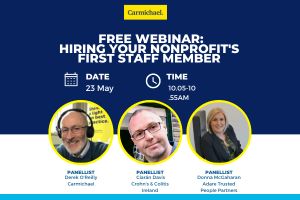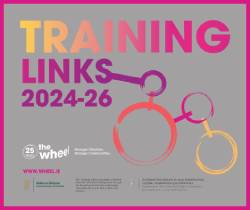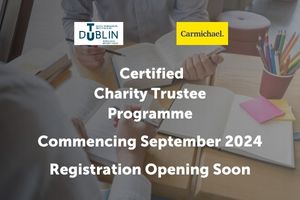Target Audience
New Board Members, Directors, Charity Trustees of non-profit organisations.
Outline
Becoming a member of a non-profit board is a rewarding and at times challenging task. Understanding the role and responsibilities of a board member makes the job easier. In this eLearning course we provide you with a structured sequence of topics, each of which is designed to further your knowledge of corporate governance and support your understanding of your voluntary board role.
This course can be accessed for up to 60 days after purchase.
Course Structure
The course comprises eight lessons and takes approximately three hours to complete.
Lesson 1: Governance Overview
Lesson 2: Board Member Roles and Responsibilities
Lesson 3: The Chairperson
Lesson 4: Board Relationship with CEO/Staff
Lesson 5: Company Limited by Guarantee
Lesson 6: Charities and Charity Trustees
Lesson 7: Getting the most from Board Induction
Lesson 8: Why Boards Underperform
Upon completion of the course lessons, you may wish to complete the course quiz. Successful completion of the course quiz provides you with an opportunity to download a Certificate of Completion.
Note: Once an e-Learning course is booked, it could take up to 48 hours for login details to be provided.
NOTE: When booking, please make sure to input all the correct contact details onto the booking form as the information will be used to create learner profiles. Should information be entered incorrectly it could delay the booking process.
Target Audience
New Board Members, Directors, Charity Trustees of non-profit organisations.
Outline
Many thousands of non-profit organisations in Ireland are also registered charities. This means these organisations meet ‘The Charity Test’ and can thus be entered onto the register of charities in Ireland by the Charities Regulator.
The board members of non-profit organisations that are also registered charities are referred to as charity trustees. A list of the trustees for each registered charity in Ireland is publicly viewable on the Charities Regulator website.
Charity trustees must ensure that their charities comply with their obligations under the Charities Act 2009 and the related reporting and compliance obligations set out by the Charities Regulator.
This course can be accessed for up to 60 days after purchase.
Course Structure
In this course, we have created an overview of what a trustee should be aware of when joining a charity board. The course comprises five lessons and takes approximately one hour to complete.
Lesson 1: The Charities Act 2009
Lesson 2: Functions of the Charities Regulatory Authority
Lesson 3: General duties of charity trustees
Lesson 4: The Charities Governance Code
Lesson 5: Charity compliance requirements
Upon completion of the course lessons, you may wish to complete the course quiz. Successful completion of the course quiz provides you with an opportunity to download a Certificate of Completion.
Note: Once an e-Learning course is booked, it could take up to 48 hours for login details to be provided.
NOTE: When booking, please make sure to input all the correct contact details onto the booking form as the information will be used to create learner profiles. Should information be entered incorrectly it could delay the booking process.
Target Audience
Anyone working in Social Enterprise who would like to create positive impacts in their beneficiaries lives.
Outline
Social enterprises play a pivotal role in the delivery of services and supports in Ireland. Beneficiaries can speak first hand of the positive impact these supports have on their lives.
Social enterprises compete with a wide range of other companies and organisations in a bid to generate trading income. The challenge in such instances is to generate financial returns without comprising social outcomes and impact.
This course is designed to put social impact at the heart of business planning and conversations around social enterprise development.
Course Structure
Section 1: External Environment in Context
This section explains how to analyse the external business environment in which a social enterprise operates. To that end several topics are explored:
- Environmental Analysis – PESTEL
- Competitor Analysis
- Market Analysis
- Municipal Authority Plans
- Government Policy
- EU Policy initiatives
- Funder Priorities
Section 2: Internal Analysis
In this section, we explore the factors at play within a social enterprise that influence decisions concerning business strategy and the nature of social impact pursued. The topics we cover here are:
- SWOT Analysis
- Drivers of Change
- Cost Analysis
- Review of Assets
- Assessing Capacity
- Leadership Priorities
- Succession Plans
Section 3: Social Enterprise Strategy
This section considers the options that social enterprises have when setting business direction. Key topics covered include:
- From Activities and Outputs to Outcomes and Impact
- Developing and Using a Theory of Change
- Business Models
- Funding Models
- ESG Impact Investing
- Scaling Opportunities
- Asset Utilisation Strategy
- Selecting a Viable Business Strategy
- Integrating Impact Management and Business Strategy
- Implementing Business Strategy and Achieving Social Impact
Section 4: Marketing
This final section of the course provides an overview of the importance of branding in helping a social enterprise to communicate the value that it delivers. Topics covered include:
- Identifying Brand Values
- Developing a Social Enterprise Brand that Communicates Social Outcomes and Impact
- Developing a Value Proposition Statement
- Developing Effective Market Development Plans
- Maximising Income Generating Opportunities
Upon successfully completing the course, participants may download a course Certificate of Completion.
Note: Once an e-Learning course is booked, it could take up to 48 hours for login details to be provided.
NOTE: When booking, please make sure to input all the correct contact details onto the booking form as the information will be used to create learner profiles. Should information be entered incorrectly it could delay the booking process.
Target Audience
Anyone looking to learn about good practice in carrying out the Role of Treasurer in a non-profit organisation.
Outline
Appointing a board member to the role of Treasurer is important for a non-profit board. Typically, most board and committee members do not come from financial backgrounds. It is therefore helpful to have at least one member of a Board who understands, and is capable of, communicating to board members the implications of financial decisions taken in the organisation.
Please note that in this course, we will use the term Board to cover non-profit boards and management committees alike. We will use the term ‘organisation’ to cover all types of non-profit entities including companies limited by guarantee, voluntary groups, co-operatives and unincorporated associations.
This course can be accessed for up to 60 days after purchase.
Course Structure
The course is divided into 7 component parts and takes approx. 1.5 hours to 2 hours to complete. Participants should allow for additional time to review the templates which accompanies the course. Topics are self-contained to facilitate micro-learning for the time conscious participant.
1. The Role of Treasurer in Context
In this lesson, we learn about the duties attaching to the role of Treasurer and the collective responsibilities of a non-profit board.
2. Monitoring Income and Expenditure
In this lesson, we consider the important role the Treasurer plays in helping a non-profit Board to effectively monitor income and expenditure in an organisation.
3. Communicating with Non-Financial Board Members
In this lesson, we consider how financial information can be more practically conveyed to board members at meetings using financial dashboards.
4. Managing Financial Risk
In this lesson, we consider the actions a board needs to take to manage financial risk and the practical support a Finance Sub-committee can provide to a board.
5. Planning Budgets and Cash Flow
In this lesson, we take a practical look at the work involved in developing budgets and cash flow projections to help guide performance expectations in an organisation.
6. Crafting Financial Policy and Procedures
In this lesson, we consider the type of financial procedures that may be required to help Boards and managers exert adequate financial control in their organisations.
7. Working with Stakeholders
In this lesson, we consider the range of stakeholders that an organisation supports and works with and the implications for the Treasurer.
Upon successfully completing the course, participants may download free of charge a course Certificate of Completion.
Note: Once an e-Learning course is booked, it could take up to 48 hours for login details to be provided.
NOTE: When booking, please make sure to input all the correct contact details onto the booking form as the information will be used to create learner profiles. Should information be entered incorrectly it could delay the booking process.
BLAH BLAH BLAH
Test test test
Target Audience
Anyone looking to learn about good practice in the important function of taking accurate meeting minutes.
Outline
Accurate minute taking is an essential part of good meeting practice. The keeping of accurate meeting minutes is also an essential requirement for non-profit companies.
This course can be accessed for up to 30 days after purchase.
Course Structure
The course is divided into 5 component parts and takes approx. 30 minutes to review. Participants should allow for additional time to review the minutes template which accompanies the course. Topics are self-contained to facilitate micro-learning for the time conscious participant.
1. Taking Meeting Minutes
In this lesson, we review the role of minute taker and the different types of minutes that may be taken at meetings.
2. How to Take Meeting Minutes
In this lesson, the focus is on discursive minutes and how such minutes may be recorded.
3. Listening Skills
Good listening skills are essential for individuals taking notes during meetings. In this lesson, we learn more about active listening and methods for improving listening skills.
4. Note Taking During Meetings
In this lesson, we consider how best to prepare for the role of minute taker at a meeting.
5. How to Help Luke?
In this lesson, we apply what we have learned in previous lessons to a relevant hypothetical situation.
Upon successfully completing the course, participants may download free of charge a course Certificate of Completion.
Note: Once an e-Learning course is booked, it could take up to 48 hours for login details to be provided.
NOTE: When booking, please make sure to input all the correct contact details onto the booking form as the information will be used to create learner profiles. Should information be entered incorrectly it could delay the booking process.
vvvvvvvvvv
xxxxxxxxxx
text xxxxxx




